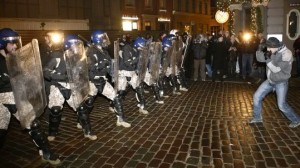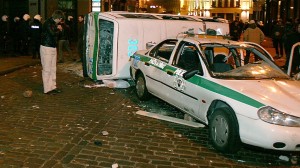
Last year's violent confrontation between police and demonstraters was unprecedented in post-Soviet Latvia.
RIGA — Wednesday marked the one-year anniversary of Riga’s downtown riot, an event that shocked both the nation and the region and in many ways signified a watershed in Latvia’s socio-political structure.
What started out a peaceful demonstration on Dome Square rapidly disintegrated into an outburst of violence, with a mob smashing windows of the parliament and finance ministry buildings and several commercial enterprises.
There is still widespread disagreement as to what sparked the violence. Some blame the organizers of the protest meeting, particularly, a Society for Different Politics, while party members and others counter that Latvia’s political elite, i.e., the People’s Party is to blame since it allegedly withdrew police security from the area in the hope that melee would ensue and the opposition’s reputation would be dealt a blow. And, as always, still others point the finger at the perennially meddlesome eastern neighbor.
“Without a doubt, we woke up in a different country on January 14,” Parliamentary Chairman Gundars Daudze told LNT on Tuesday.
“I think we weren’t used to the fact that the discontent in certain parts of society could be expressed this way … such problems arise from a failure to explain the decisions that we’ve made,” Daudze said.
President Valdis Zatlers, meanwhile, said that the fury unleashed one year ago in Riga wasn’t aimed at the government at the time — the cabinet of Prime Minister Ivars Godmanis — but at the entire establishment and its decisions over recent years.
“This dissatisfaction in society was built up over years,” Zatlers told the Delfi portal in an interview published Wednesday.
“One of the lessons is obvious for all of us — we need to conduct an active dialogue with societal groups,” said Zatlers, who the day after the riot issued an ultimatum to parliament to enact numerous tasks, including a constitutional amendment that would allow the electorate to hold a referendum on dissolving the legislature.

Latvian authorities are keen to avoid a repeat of the Jan. 13 riot, which caused hundreds of thousands of euros in damage. Photo by Artūrs Budahs.
The rioting, which lasted several hours and was confined to several areas on Riga Old Town, did approximately 185,000 lats (€265,000) in property damage, mainly in broken windows. Several shops, particularly a liquor store on Smilšu Street, were looted. Over a hundred people were detained, and several dozen were injured, including many police officers.
Local media reported earlier this week that the criminal cases against the rioters have yet to be brought to court. The Riga regional prosecutor is still investigating the case against 46 individuals charged with instigating the riot, the Leta agency reported. Police are still trying to establish the identity of some of the participants.
Meanwhile three of the rioters have formed a group called January 13, whose goal will be the consolidation of forces that participated in last year’s “revolutionary events.” The interior ministry said it was prepared for any possible disturbances this year. Several marginal organizations applied for permission to hold demonstrations, but they were refused.












